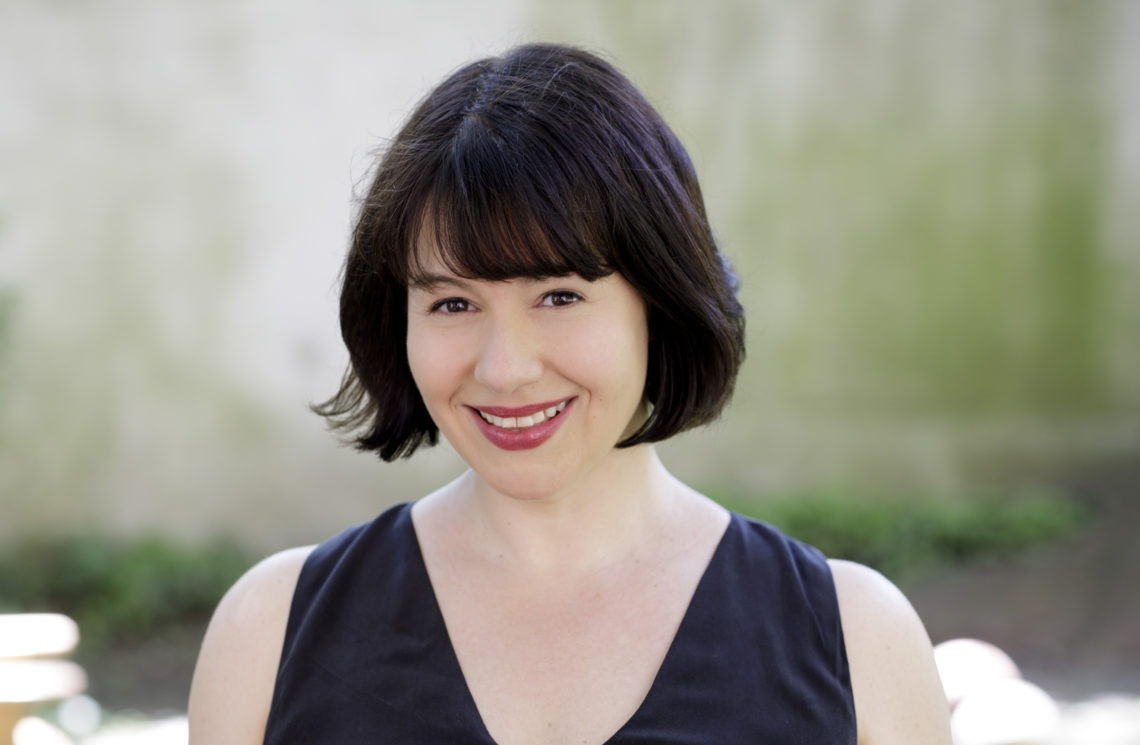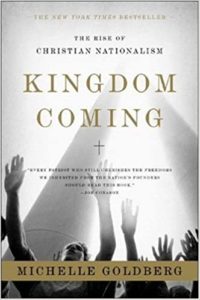
Michelle Goldberg got her first up-close encounter with what she calls “rightwing postmodernism” covering the 2004 presidential campaign in Ohio. Out on the streets, with all his canvassers, it was easy to think John Kerry might have had the upper hand. But Goldberg found “the bones of what the George W. Bush turnout operation was going to be like,” she says, in the mega-churches, where gay marriage — or any sort of same-sex civil union — animated the incumbent’s base.
There she saw “these massive crowds whipping themselves up into a frenzy at the prospect of what people called ‘the gay agenda.’” The experience inspired her first book, about Christian nationalism.
“One thing [the book] talked about was how this Christian nationalist movement created an entire and sort of impenetrable parallel reality where fact-based reporting couldn’t penetrate,” Goldberg said. “It was sort of nothing compared to what we see now. I don’t know if I ever could have imagined how bad it would get, but I think I had some inkling of how sinister this movement had the potential to be.”
Goldberg, now a columnist for The New York Times, is one of the most visible opinion journalists in the country. Fourteen years after “Kingdom Coming: The Rise of Christian Nationalism,” she writes frequently about today’s more virulent form of “rightwing postmodernism,” and especially about the president at its heart. Goldberg is also a frequent television and radio commentator and a co-host of The Times podcast “The Argument.” In addition to “Kingdom Coming,” she’s written two more books: “The Means of Reproduction: Sex, Power, and the Future of the World” and “The Goddess Pose: The Audacious Life of Indra Devi, the Woman Who Helped Bring Yoga to the West.”

Goldberg grew up outside of Buffalo, New York, where her father was the managing editor of The Buffalo News. She had always wanted to be a writer, but initially resisted following her father into journalism. But in college, first at SUNY Purchase near New York City at just 16, and then back home at SUNY Buffalo, Goldberg dabbled in the campus newspaper “and realized pretty quickly that that’s what I wanted to be doing.” She pictured herself becoming a critic or a magazine journalist.
In Buffalo, she sent some clips away to the UC Berkeley Graduate School of Journalism, which were met with a call from the school’s Clay Felker, the legendary magazine pioneer and New York magazine founder, for whom the school’s magazine center is named. Goldberg, then “living in a squat in Buffalo,” vaguely knew of him. He talked about how beautiful Berkeley was, made the case for it, and told her she should enroll. “I quickly found out who Clay Felker was and was kind of stunned that he was calling me,” she said.
At 20, she was the youngest person in her class at Berkeley Journalism and came in knowing “not a great deal about journalism” and “very little about the world in general.” Her introductory-reporting instructor, Prof. Bill Drummond, would see to that.
“She was in an unusual J200 class,” he recalled. “It was talented and highly competitive. The students pushed each other to do better work.”
Drummond summoned his students to North Gate Hall at 8 a.m. “You had to be professionally dressed. He made me take my nose ring out,” Goldberg laughed. “And you sometimes had two stories due in a day.” She was “Ms. Goldberg” to him. He was “Professor Drummond” to the class. She recalled having to read each day’s San Francisco Chronicle and New York Times. “He would have a police scanner and send you out on a police story,” she recalled. “I remember once he made us spend the night in the emergency room and come back with a story.”
“Learning to pitch is a hard thing to do; it’s very intimidating,” Goldberg added. “But I felt like he was more intimidating.” It wasn’t until she taught a journalism class herself at New York University in her late 20s that she fully appreciated Drummond’s tough love.
After graduation, Goldberg wrote for San Francisco’s alt weeklies and got into Salon when the left-wing news and culture site was helping pioneer the new world of online journalism. After a year traveling abroad, she settled in New York City, where she had always dreamed of living, and began working for Salon full time. She left to write “Kingdom Coming” and spent time freelancing and writing “The Means of Reproduction” and “The Goddess Pose.” Goldberg eventually moved from the Daily Beast, where she covered politics and the culture wars, to The Nation, where she expanded the scope of that coverage, to Slate, where she dove into the Trump era and first began contributing to The New York Times opinion section. In 2017, a Times media reporter called her, saying, “I heard you’re being considered for a columnist job.”
“And I was like, ‘No, I don’t know who told you that,’” Goldberg laughed. “‘That’s ridiculous.’” But then former editorial page editor James Bennet asked her to lunch. “And for me it was a dream come true.”
Goldberg joined The Times as an op-ed columnist in 2017. In just a year’s time, she was part of a team of Times journalists, including Jodi Kantor and Megan Twohey, that won the 2018 Pulitzer Prize in Public Service “for explosive, impactful journalism that exposed powerful and wealthy sexual predators, including allegations against one of Hollywood’s most influential producers, bringing them to account for long-suppressed allegations of coercion, brutality and victim silencing, thus spurring a worldwide reckoning about sexual abuse of women.” Goldberg’s op-ed, “I Believe Juanita,” was about Juanita Broaddrick, who accused former President Bill Clinton of raping her in 1978.
Goldberg’s column and podcast cover the complex, fast-moving, and often alarming developments and trends in national politics. To do that, she keeps up with a massive diet of news, including other major publications, from The Washington Post to The Atlantic to The New Yorker to Slate. “As much as I think that Twitter is such a toxic and terrible invention, I check it constantly,” Goldberg said. It’s an increasingly rough gig.
“I just feel like I’m marinating in it all the time in an extremely unhealthy way,” she said of the relentlessly bad headlines and President Trump’s actions.
“It’s been brutal for many, many people — and I’m very far down on the list of people who it’s been brutal for — but I find it completely wrenching,” she added. “I love this job, I’m so grateful for it. It’s kind of a strange thing to be doing my dream job and at the same time feel like the last three and a half years have been the worst years of my life. I feel it so intensely. I think if I’m good at my job, it’s because I really, really feel it.”
–Sam Goldman (’19)
